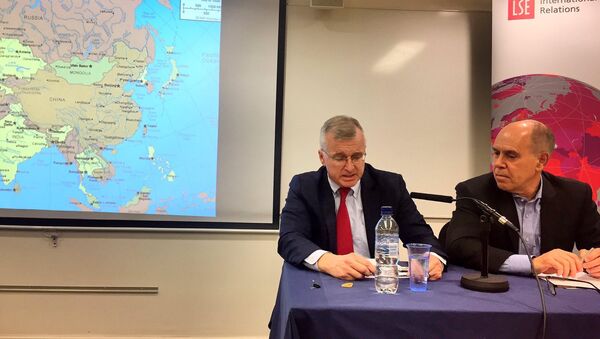According to Professor Thomas J. Christensen, Director of the China and the World Program at Princeton University, the Obama Administration has been faced with very different dynamics in comparison to when George Bush was in office.
"Although China has been a more difficult partner for Obama than it was previously during the Bush Administration, he has done an overall good job. Important factors such as regional stability and global governance have by no means been easy areas of cooperation between the two countries, but Obama's diplomatic approach has certainly helped," Christensen told the conference.
Listening to Prof Thomas Christensen on the future of US-China relations with @LSEIRDept #lsechristensen pic.twitter.com/48sQM6tMqC
— James Strong (@dr_james_strong) November 1, 2016
In terms of legacy, the bilateral agreement with China on issues related to global climate change was cited as a very positive aspect of Obama's tenure. Professor Christensen spoke about how the two countries worked together to make this important area a pillar of the US-China bilateral relationship. In his opinion, both countries have taken strong measures at home to build green, low-carbon and climate-resilient economies, and their cooperation has certainly led the way for wider global emphasis, culminating in positive developments such as the Paris Agreement reached last December.
In relation to the contentious issue of Beijing's maritime claims in the South China Sea, however, according to some attendees at the discussion, there have been significant issues of strain on relations that may have put some doubts on peaceful resolutions in the long-standing dispute.
"China will not stop commercial shipping in the South China Sea but the real question is around the issue of US military being able to sail here without any repercussions. There is certainly no aggressive stance deliberately taken by either countries, but China must be seen to be complying with international law," Professor Christensen explained.
In terms of China's domestic challenges, such as its economy, as well as issues related to rising pollution in the country, attendees expressed that this may have played a positive role in US-China relations as it enabled more open avenues of negotiation for the US.
Speaking about North Korea, Professor Christensen felt Obama's strategy of reaching out to China in order to prevent escalating aggression towards South Korea had been well handled. He described North Korea as an obnoxious, dangerous country and conveyed the importance of positive US-China relations in the long term in order to minimise any future tensions.
He faulted the White House for not heeding lessons from a history of Middle East intervention vis-a-vis the ongoing violence in Syria.
"With regard to the international perception of Obama's administration not acting effectively in regions of conflict such as Syria, it must be said that some of the key lessons from Libya and Iraq may not have been learnt when advocating regime change. This has very much been a major mistake in my opinion. Without proposing for a viable, alternative solution, the US has basically destroyed its own diplomatic position and increased support for Assad elsewhere," Professor Christensen said.
On the troubling dynamics with President Duterte of the Philippines, Professor Christensen explained:
"Obama's biggest issue during his term I feel has been around public diplomacy. The next office must say less and do more and when it comes to dealing with leaders such as President Duterte. We can appeal to the public of a nation as opposed to directly communicating with the leaders alone. It will be very difficult for the US to work with a state such as Philippines especially if you look at human rights issues such as the judicial killings in the nation that have been allowed to take place."
One attendee asked Christensen about the UK-China relationship in light of the Brexit vote.
"Brexit could end up affecting the UK's economic relationship with China, because the EU is very much a significant bloc trading partner. But I very much see UK's role in Asia very much supporting the same approach as the US, i.e., showing a commitment for international rules of law, peaceful settlement of disputes and the use of diplomacy."
For now, China's immediate focus is very much on its own testing domestic matters, whilst the US waits in anticipation for its presidential result. Matters of international trade relations will certainly continue to be one area where much positive effort and cooperation will surely be encouraged by both sides mutually.
But as Obama's office makes way for a new administration, election results will very much define the future direction of US-China relations, as well as overall foreign policy.



